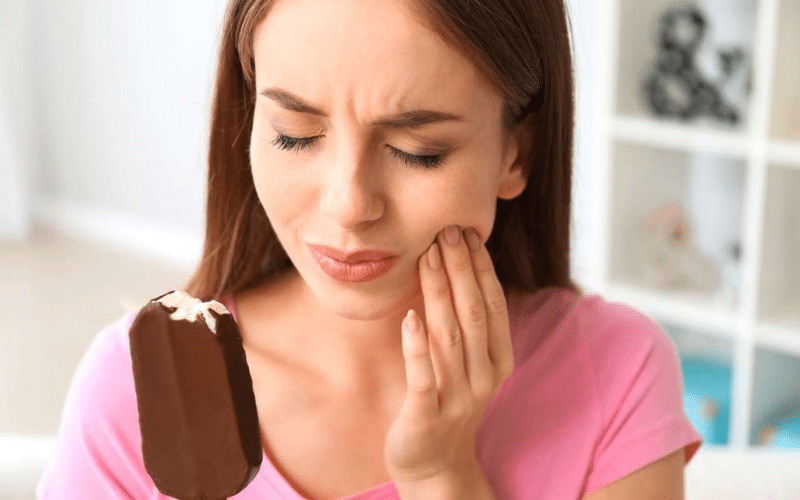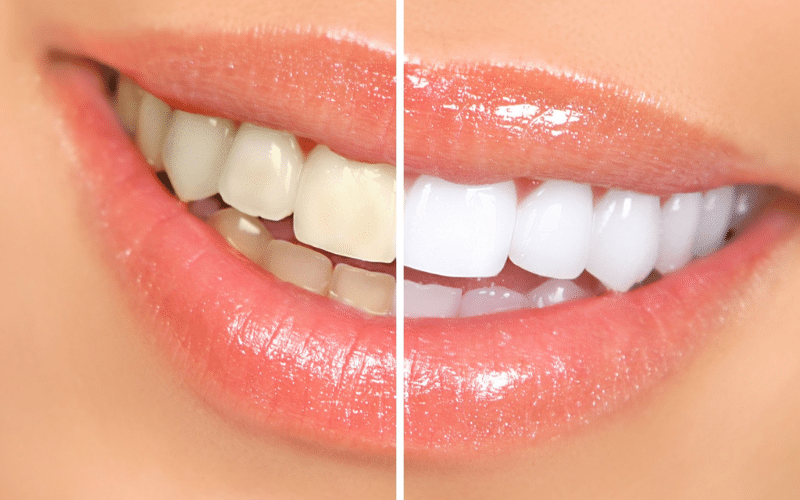Zoom whitening treatment has become a popular option for individuals looking to achieve a brighter, whiter smile. However, for those with sensitive teeth, the question often arises: Is It safe?
In this blog, we’ll dive deep into what Zoom whitening is, how it works, and whether it’s a good choice for individuals with sensitive teeth. Additionally, we’ll provide tips to minimize discomfort and ensure you get the best results without compromising your dental health.
What’s a Zoom Whitening?
Zoom whitening is an in-office teeth whitening treatment that uses a specialized light to accelerate the bleaching process. It can lighten teeth by several shades in just one session, making it one of the quickest ways to achieve a brighter smile.
How Does It Work?
- The dentist applies a hydrogen peroxide-based whitening gel to the teeth.
- A Zoom light is used to activate the gel, breaking down stains and discoloration.
- The process is repeated several times during a single session to maximize whitening results.
- A fluoride-based gel may be applied afterward to reduce sensitivity.
This treatment is effective at removing surface stains caused by coffee, wine, tobacco, and other substances, leaving the patient with a whiter and more radiant smile.
Causes of Tooth Sensitivity
Before deciding if Zoom whitening is safe for sensitive teeth, it’s essential to understand why teeth become sensitive in the first place.
Common Causes of Sensitivity
- Enamel Erosion: Enamel can wear away due to acidic foods, teeth grinding, or brushing too hard, exposing the dentin, which leads to sensitivity.
- Receding Gums: Gum recession exposes the roots of the teeth, which are more sensitive to external stimuli like heat, cold, and whitening agents.
- Tooth Decay or Damage: Cavities or cracked teeth can lead to increased sensitivity, especially when exposed to whitening products.
- Teeth Grinding (Bruxism): Grinding your teeth can weaken enamel, making teeth more prone to sensitivity.
Is Zoom Whitening Safe for Sensitive Teeth?
Zoom whitening is generally considered safe, even for people with sensitive teeth. However, individuals with sensitivity should be cautious. The whitening agents used in Zoom whitening can aggravate existing sensitivity, at least temporarily. The hydrogen peroxide gel can penetrate the enamel and dentin, causing increased sensitivity during and after the procedure.
Safety Factors To Consider
- Consult with a Dentist First: It’s crucial to consult with your dentist before undergoing Zoom whitening, especially if you have sensitive teeth. Your dentist can evaluate the condition of your teeth and gums and advise whether the treatment is suitable.
- Customization for Sensitivity: Dentists can adjust the strength of the whitening gel to accommodate sensitive teeth. In some cases, using a lower concentration of hydrogen peroxide can help minimize discomfort.
- Use of Fluoride: After the treatment, the application of a fluoride gel can help to desensitize the teeth and reduce discomfort.
Tips To Manage Sensitivity During This Treatment
If you decide to go ahead with Zoom whitening despite having sensitive teeth, there are several strategies you can use to minimize discomfort during and after the procedure.
1. Pre-Treatment Sensitivity Toothpaste
Using a toothpaste specifically designed for sensitive teeth for at least 2 weeks before the treatment can help build resistance to sensitivity. Look for products containing potassium nitrate, which helps block pain signals to the nerve.
2. Use of Fluoride
Ask your dentist to apply a fluoride varnish after the whitening session to help remineralize the enamel and reduce post-whitening sensitivity.
3. Shorter Treatment Times
Discuss with your dentist the possibility of shorter treatment sessions. Breaking the Zoom whitening into smaller, less intense sessions can help reduce the amount of sensitivity you experience.
4. Over-the-Counter Pain Relief
If you experience discomfort during or after the treatment, over-the-counter pain relievers like ibuprofen can help manage the pain.
5. Avoid Hot & Cold Food
For at least 24-48 hours after the treatment, try to avoid very hot or cold foods & beverages. Your teeth may be more sensitive to temperature changes following Zoom whitening.
Post-Treatment Care for Sensitive Teeth

After your Zoom whitening treatment, it’s essential to take extra care of your teeth to ensure the results last and to manage any potential sensitivity.
- Use Sensitivity Toothpaste: Continue using a desensitizing toothpaste post-treatment to maintain comfort.
- Stay Hydrated: Drinking water helps rinse away any food particles and prevent plaque buildup, reducing the risk of sensitivity.
- Avoid Acidic Foods: Citrus fruits, soda, and acidic foods can erode enamel, which could increase sensitivity after whitening.
- Maintain Good Oral Hygiene: Brushing twice daily & flossing regularly will help keep your teeth healthy and minimize post-whitening discomfort.
- Limit Stain-Causing Foods: For the first 48 hours after your whitening session, avoid foods and drinks that can easily stain your teeth, such as coffee, tea, red wine, and dark berries.
So, is zoom whitening safe for sensitive teeth? Yes, it can be, but it requires special care and consideration. If you have sensitive teeth, it’s essential to consult with your dentist first to assess the risks and explore customized treatment options.
Taking pre- and post-whitening precautions—like using desensitizing toothpaste, fluoride treatments, and avoiding hot or cold foods—can help manage any discomfort.
Ultimately, while Zoom whitening treatment is an effective and safe option for most people, those with sensitivity need to take extra steps to ensure a comfortable experience. Always weigh the benefits of a whiter smile with the potential risks and choose the option that’s right for your dental health.

